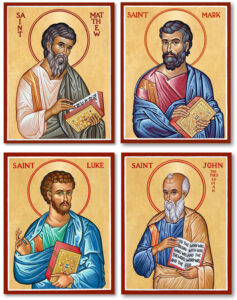The Four Evangelists and all Fathers of the 3 Ecumenical Synods – May 20

The Malankara Indian Orthodox Church commemorates the Four Evangelists or Gospel Writers and all Fathers of the 3 Ecumenical Synods on May 20. The Gospel writers who bring the Good News of Our Lord, God, and Saviour Jesus Christ and those saintly fathers of the Three Ecumenical Synods who courageously defended and zealously spread the true doctrine of Jesus Christ.
The Four Evangelists
The Gospel (Evangelion – ‘glad tidings’ or the ‘good news’) is the message of our Lord and Saviour Jesus Christ. The Gospel – is a central part of the Orthodox Christian theology, worship, and tradition. The life of the Church is centred in this Gospel. The Gospel Book is a symbol of Christ and the Gospel reading is a fundamental part of the Divine Liturgy and of all Orthodox Mysteries, thus symbolizing that the Gospels are the pillars of our Faith. It is about the living fulfilment of the law and the prophets, Christ, who abides in the midst of His People, the Church, through the presence of the Holy Spirit. The purpose of the gospels is to point sinners to the only way to receive eternal life.
An Evangelist is one who brings the Good News of Our Lord, God, and Saviour Jesus Christ. The first books of the New Testament scriptures are the four gospels of Saints Matthew, Mark, Luke, and John. Together, these four gospels serve as a fourfold witness of the earthly ministry and character of Jesus Christ. The gospels tell of the life and teaching of Jesus, written by the disciples of Christ, who were filled with the Holy Spirit after the Lord’s Resurrection, to bear witness to the fact that Jesus of Nazareth is indeed the promised Messiah – Christ and the Saviour of the world. We encounter Christ or are being encountered by Christ, when we read, study, and meditate the words of the Gospels, in the hope of being nourished with the ‘Words of Eternal Life’ (John 6: 68)
The Four Evangelists were related to the four cardinal directions (Gen. 28:14; 1 Chron. 9: 24; Ez. 1: 17; Luke 13: 29), the four corners of the world (Is. 11: 12, Ez. 7:2, Rev. 7: 1,), the four seasons, the four winds (Jer. 49:36; Matt. 24: 31; Zech. 6: 5), the four quarters of heaven (Jer. 49:36) and the four elements – earth, fire, water and air, that made the world and each human being, namely. The four Gospels also reflected the quaternities of the Old Testament: the four rivers of Paradise (Gen. 2:10) or the four corners of the Ark of the Covenant (Exodus 25: 8-12). The number of four also arises from the four different perspectives, in four different angles about Christ’s life, teachings and ministry.
The Gospels writers present the portrait and teaching of Jesus, so that the reader will believe in Him as Messianic Saviour of mankind, Sovereign King, Master Teacher and Lord of all. The four Evangelist portray Christ uniquely. Matthew presents Jesus, the King, Son of God (Is. 11: 1; Matt. 1: 1) is the Incarnate God and Jewish Messiah, the fulfilment of Old Testament hopes. Mark portrays Jesus, the Servant, Son of Man (Zech. 3: 8; Mk. 8: 36) is the Suffering Servant and Messiah, who offers himself as a sacrifice for sins. Luke depicts Jesus, the Perfect Man, Son of Adam (Zech. 6:12; Luke 3: 38) is the Saviour for all people, who brings salvation to all nations and people groups. John, paints Jesus, the word of God, Son of God (Is. 4: 2; Jn. 3: 16) is the eternal Son of God, Who has come in flesh, the self-revelation of God the Father.
The Evangelists brings to us Jesus Christ, Who is God from all eternity who came down to earth as the perfect man, the Messiah of Israel, the King of the Jews. Our Church commemorate the four Evangelists on May 20.
All fathers of the 3 Ecumenical Synods
All the fathers of the Fathers of the three Ecumenical Council, the saints of the early Church who courageously defended and zealously spread the true doctrine of Jesus Christ. They prevented the spreading of the false teaching, and heresies. The Holy Spirit strengthened them and us to remain true to the Faith. Under the inspiration of the Holy Spirit, the Fathers of Nicaea, Constantinople, and Ephesus zealously guarded the true faith, to preserve it intact for future generations. The Fathers stand as foundational pillars who always point back to Jesus Christ and show with their writings and example what it means to be a Christian.

The Fathers had given great enlightenment to the Church of their time. May we within whom the Holy Spirit is welcomed and alive give witness to Christ. For the Holy Spirit is a spirit of Love and Truth. We thank God for the wisdom of the Fathers of the Three Ecumenical Council and their desire that the teachings of the Church be clear and of the true faith, not only for then, but now and for all future generations. May we inspire others to do likewise. May our light shine before others so that they may see the goodness in our deeds.

0 Comments